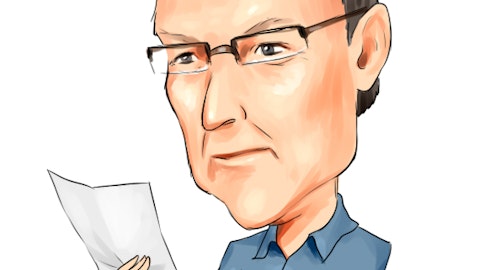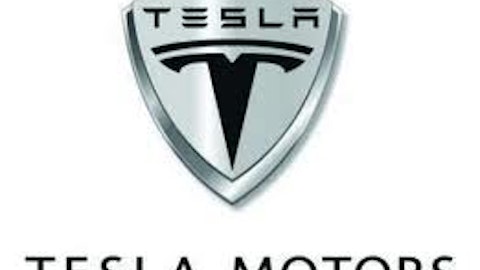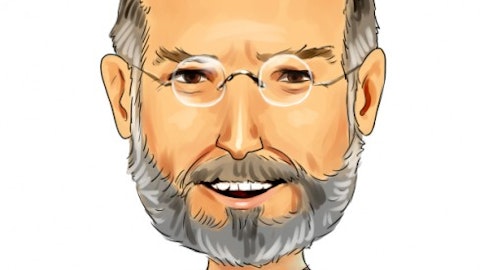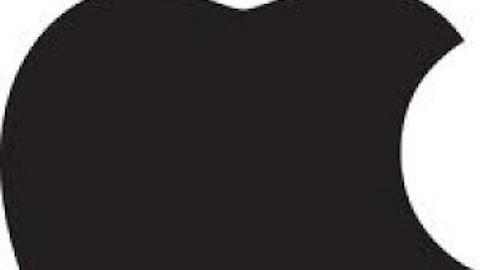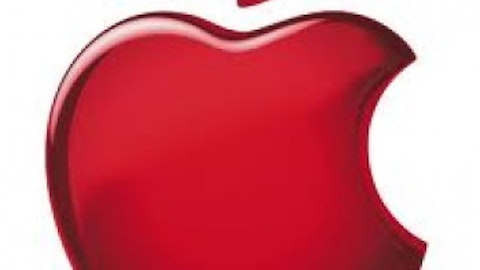Despite the fact that Apple Inc. (NASDAQ:AAPL)’s earnings exceeded expectations on Tuesday, shares of the Cupertino tech giant slid early Wednesday.
Barring the introduction of a revolutionary new product, Apple Inc. (NASDAQ:AAPL)’s best days seem behind it: profitability is falling, margins are declining, and growth is slowing. On a year-over-year basis, earnings per share dropped 18%.
Despite pledging to return $100 billion of capital to shareholders, Apple Inc. (NASDAQ:AAPL)’s stock is still down over 40% from its all-time high. But why? I’ve pulled three quotes that I believe illustrate the fundamental problems Apple Inc. (NASDAQ:AAPL) is facing.

Steve Jobs, 1985
“Japan’s very interesting. Some people think it copies things. I don’t think that anymore. I think what they do is reinvent things. They will get something that’s already been invented and study it until they thoroughly understand it. In some cases, they understand it better than the original inventor. Out of that understanding, they will reinvent it in a more refined second-generation version. That strategy works only when what they’re working with isn’t changing very much—the stereo industry and the automobile industry are two examples. When the target is moving quickly, they find it very difficult, because that reinvention cycle takes a few years. As long as the definition of what a personal computer is keeps changing at the rate that it is, they will have a very hard time.” (Playboy)
Back in 1985, few people owned cell phones, let alone an iPhone. Yet, Jobs’ take on innovation back then is equally applicable to today.
In the mid 80s, American companies were struggling against imported, mostly Japanese, rivals. Although Americans had invented everything from the mass-produced car to the stereo, the Japanese had been able to offer better products at more attractive prices.
Likewise, Apple Inc. (NASDAQ:AAPL) is facing competition from imported rivals, though now, these companies are generally located in Korea — not Japan. Korean tech giants like LG, HTC and most notably Samsung, have produced a wide array of Android-powered smartphones that are arguably better than Apple Inc. (NASDAQ:AAPL)’s iPhone.
Of course, as Jobs noted, this is only possible when the tech being copied isn’t changing, and unfortunately for Apple, that’s largely been the case. With the exception of slight hardware changes — a higher resolution screen, 4G connectivity — the iPhone has not significantly changed in the last four years.
Meanwhile, Google Inc (NASDAQ:GOOG) has done much to improve Android in recent years. Early incarnations were notoriously buggy and slow; recent versions are significantly more stable and every bit as good as Apple’s iOS. In fact, some recent Android additions are better than Apple’s comparative features. Google Inc (NASDAQ:GOOG) Now, for example, has been seen by many as a superior alternative to Apple’s Siri.
Although Google makes no money directly from Android — it gives the open source operating system away for free — it has long been in Google’s interest to support an alternative mobile operating system. Google uses Android to push its web services, like YouTube, gmail, Google Docs and maps. Apple has been working to eliminate Google’s services from its iPhone.
Tim Cook, Jan. 2013
“The iPhone 5 offers as you know a new 4-inch Retina display, which is the most advanced display in the industry and no one comes close to matching the level of quality of the Retina display. It also provides a larger screen size for iPhone customers without sacrificing the one handed ease-of-use that our customers love. So, we put a lot of thinking into screen size and believe we’ve picked the right one.” (Earnings transcript)
Within a few months of its launch, it was obvious to most objective observers that Apple had made a mistake with the iPhone 5’s screen. Although the Retina display is undoubtedly high quality, its 4-inch screen is simply too small.
Over the last year, nearly all competing handset makers have increased the size of their screens, with 5-inch screens emerging as the new standard. The flagship phones from HTC, Samsung, Nokia Corporation (ADR) (NYSE:NOK), Sony Corporation (ADR) (NYSE:SNE) and LG all offer 5-inch (or near 5-inch) screens.
Sony’s Xperia Z hasn’t received as much attention as other Android phones from Samsung or HTC, but the handset could be the focal point of a renewed effort by the company to re-establish itself in consumer electronics. In addition to a 5-inch, full HD display, the Xperia Z is waterproof.
What’s more, the Xperia Z redefines the meaning of ecosystem. While Apple’s iOS devices are known for working well together, Sony Corporation (ADR) (NYSE:SNE)’s Xperia Z will leverage the company’s strengths in other electronic markets. For example, a consumer with a Sony TV will be able to beam their phone’s screen to the TV by simply tapping it on the remote; someone with a Sony stereo can send their phone’s audio to over their speakers in similar fashion.
Despite the fact that Cook continues to defend the size of the iPhone 5’s screen, it may have driven some customers away. Apple analysts, including Topeka’s Brian White, believe Apple will rectify this mistake when it refreshes the iPhone later this year.
Jeff Gundlach, Nov. 2012
“It seems like every meeting I have, everyone owns it.” (CNet)
Gundlach, CEO of DoubleLine Capital, is mostly known for being a bond investor. But he deviated from his traditional domain last April when he said it was time to short Apple. Back then, shares were trading near $600, and although Apple continued to rally, Gundlach was ultimately right — shares hit his $425 price target earlier this year.
Gundlach’s thesis was relatively simple: Apple was over-hyped, over-owned and over-followed. The stock had become a mini-bubble, and there was no one left to buy shares. In September, a record 231 hedge funds owned shares of Apple, making it the most popular stock among hedge funds.
As shares tumbled in the fall, hedge funds began to exit, including such heavyweights as Omega Advisors and Jana Partners.
Buy Apple?
On Tuesday’s earnings call, Cook promised new devices coming in the fall. Those devices could simply be small, incremental upgrades, or revolutionary new products that restore Apple’s growth.
No one outside of Apple knows. For the time being, Apple continues to struggle with a declining business, and shares have corrected for that decline. While the stock continues to look cheap on the basis of its financials, this has been the case for months. Until Apple can show that it’s still capable of growth, investors should look elsewhere.
The article 3 Quotes That Explain Apple’s Demise originally appeared on Fool.com and is written by Salvatore “Sam” Mattera.
Copyright © 1995 – 2013 The Motley Fool, LLC. All rights reserved. The Motley Fool has a disclosure policy.
